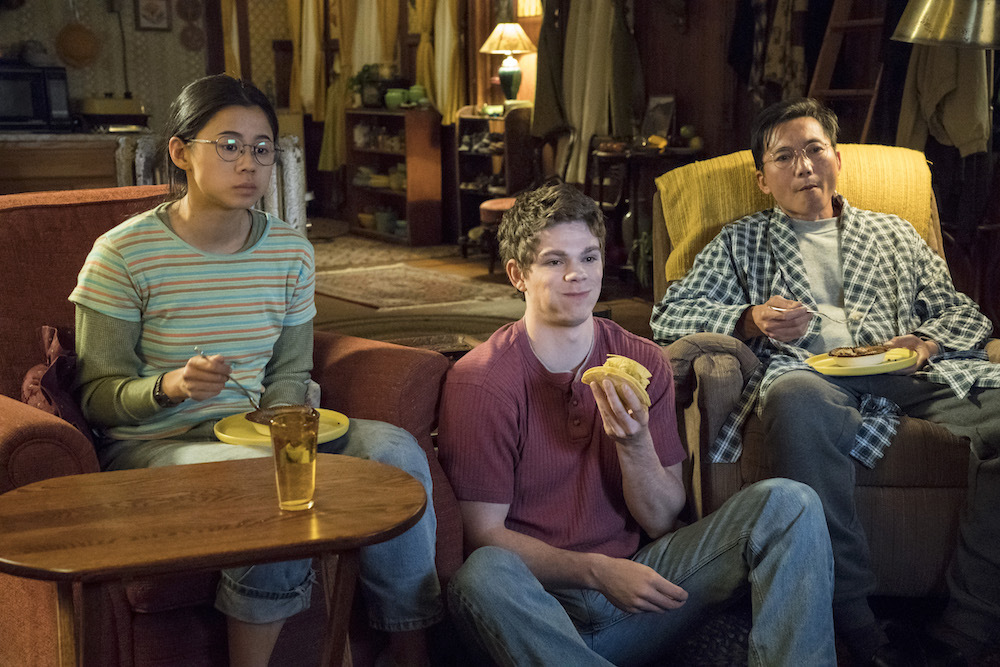Shame on you, movie industry. Alice Wu writes and directs a well liked film called Saving Face in 2004. But because the film industry wasn’t exactly ready for a voice like hers, she went to work in the tech industry for 15+ years, depriving us of years of amazing stories. Don’t believe me? The Half of It is one of the best coming of age movies out of the Netflix renaissance of the genre, giving a wholly unique spin on that type of story, something that does not happen easily.
Loosely based on Wu’s own experiences, Leah Lewis plays Ellie Chu, a Chinese-American high school student in a small town who makes bank writing term papers for all her colleagues to the amusement of her teacher (the perennially wonderful Becky Ann Baker). One day, Paul Munsky (Daniel Diemer), a dimwit of a football player, pays her a lot of money to write a letter to his secret crush: preacher’s daughter and top of the school social system, Aster Flores (Alexxis Lemire). Aster, despite being attached, is drawn into the texts/letters from Ellie aka Paul, which grows into 2 problems: eventually simple Paul is gonna have to meet in person, and Ellie also crushes hard on Aster on the DL.
The Half of It’s town, Squahamish, plays almost as important a role in the movie’s success as the story. Most teen comedies obsess over sex. THAT’s the be all end all. If you’re from a small, conservative town like Ellie, Paul, or Aster? Love is way more important: that’s the be all end all, elevating the stakes of the movie simply by having real emotions take precedent over carnal ones. Dreams? They’re much smaller, usually revolving around getting a new lease on life or getting out of a place that’s trapped you in. Ellie and Aster feel trapped: Ellie’s stuck in a train station watching the world pass by her, and Aster is a reverend’s daughter. Paul is content with his life situation, but feels trapped by his brain, betraying the depth of feelings he possesses. Church plays a prominent role in society and life there. If you want to see a great faith based scene, watch Ellie and Aster reveal their beliefs to one another. Alice Wu’s specificity and understanding of small town dynamics and personalities elevates The Half of It out of trope and cliche status.
In fact, the story is RIFE with chances to fall apart because of a cliche, or have a character turn into a jerk, or force a fight for no reason. Which is why Alice Wu’s script is so amazing, taking tired premises like love triangles, Cyrano de Bergerac drama, or veiled secrets and filtering them through her empathetic, culturally rich and specific lens. My favorite spin? Everyone in this movie is simply a good person. Ellie and Paul, while courting Aster, have these lovely bonding sequences where the the cynical, closed off Ellie opens up to a new friend and her equally emotionally stunted father (Collin Chou) and Paul ceases to become affably stupid and graduates to affable, because he simply listens, learns, and cares. Aster herself isn’t simply the “dream girl” as is often the case in these films; like Ellie, she lives a cloistered existence she’s gently breaking away from, and like Paul she’s really caring and willing to give people a chance on good faith. Conflict arises not from some evil turn from someone, but organically, when the situation and secrets become untenable. Once the break happens, Wu also writes a lovely coda where each of our leads learns from this experience, and grows into a fuller, more realized person than they were before, ending on just the right note.
I teared up more than a few times watching The Half of It, and I’m pretty sure most of you will too. Alice Wu’s movie is a lovely reminder that there’s some good people in this world, and they’re willing to go the extra mile to help each other grow and become better people. Sometimes that’s with some light philosophy. And sometimes that’s with braised pork sausage tacos.

